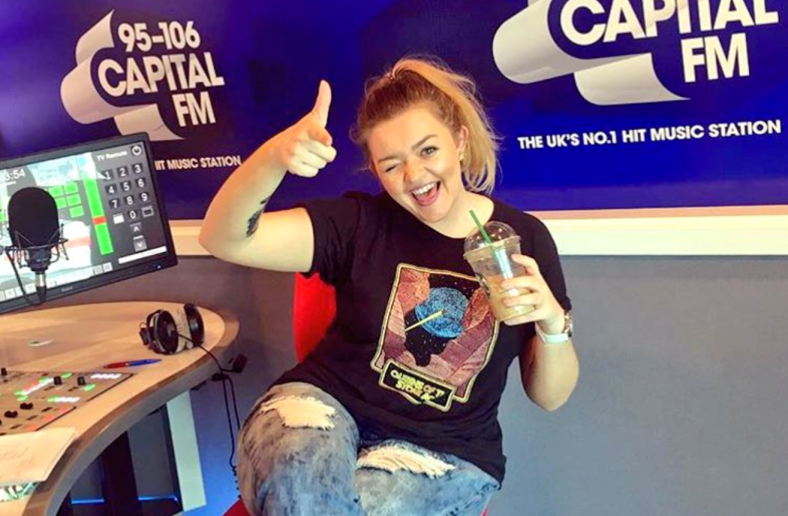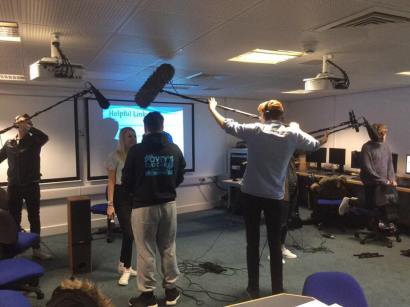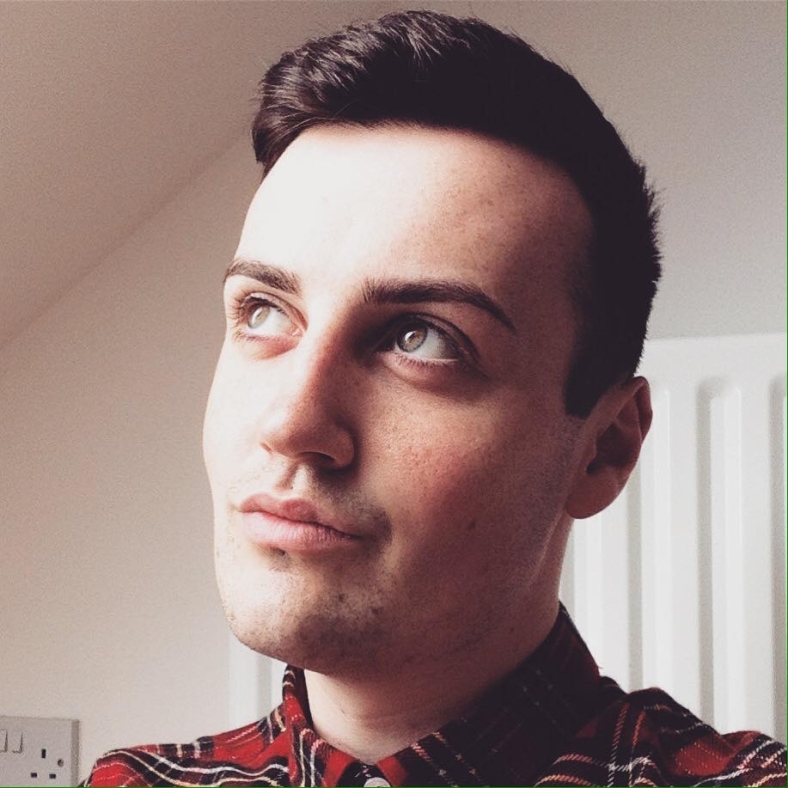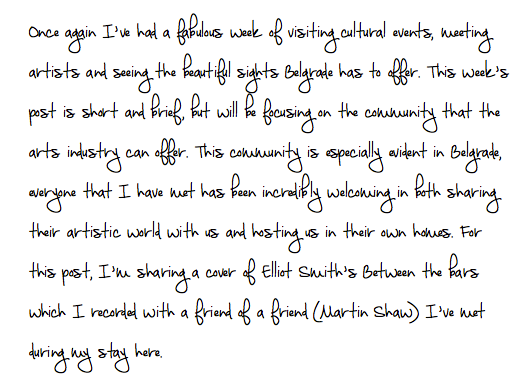Meet audio producer & poet Stuart Russell – the second in a mini-series of posts, dedicated to the audio producers & artists whose work will be showcased at Solo Arts’ Audio Cinema night, Tuesday 2nd May 2018.
Category Audio
Behind the Sound Design – Larnie Moles
Meet audio producer Larnie Moles – the first of a mini-series, showcasing the guests behind Solo Arts’ upcoming Audio Cinema night, Tuesday 2nd May 2018.
How to Attract Attention with your Audio Features

University of Sunderland’s media & radio students at Charles Parker Day 2017
Meet RJ Phoenix, emerging audio producer MA Radio student at the University of Sunderland, RJ Phoenix.
Earlier this month, audio producer RJ Phoenix received a nomination for this year’s Charles Parker Prize, at the annual event which gives recognition to strong audio production work by students across the UK.
“It’s given me more confidence, that I’m on the right track as an audio producer,” said RJ. “One day, I might be able to earn some money out of it. But it’s the recognition, really, that your work is good, and people think it’s of value.”
Continue reading “How to Attract Attention with your Audio Features”
From Student Radio to Commercial Radio
Capital North East presenter Alex Burgess; how she broke into the industry.

How to Create an Audio Drama Series on Little-to-No-Budget
 by Pete Lutz
by Pete Lutz
So you say you’re a creative type who has always wanted to put together some kind of artistic endeavour that will enthral the masses and make you big bucks at the same time? Well, that’s really quite wonderful, but I’m sorry, you’re reading the wrong article. No, this is for somebody who is desperate to provide a bit of entertainment to anyone who may listen, and to create that entertainment on an absolutely near-invisible shoestring budget.
Actually, this is more of a story about how I did it, and there are some steps here that I don’t recommend for everybody, but you should still know everything. Well, almost everything. I won’t bore you with all the sleepless nights I spent weeping over it like it was my own child. Oh. Looks like I just did. So, why not read on?
 1. COME UP WITH A WONDERFUL IDEA.
1. COME UP WITH A WONDERFUL IDEA.
Audio dramas are stories that are told so well that the listener can see it like a movie in his mind. It’s your job to come up with that story. You can do what I did, which is create an anthology series called Pulp-Pourri Theatre (each episode a standalone story with a beginning, middle and end), or you can go the way of a serial and have several episodes with a longer, drawn-out story. The choice is yours, and you should go ahead and write the outline for your series. No, go ahead. I’ll wait right here until you’re done. Got any magazines?
Continue reading “How to Create an Audio Drama Series on Little-to-No-Budget”
YAP Audio Production
 Meet Robert Cudmore, one half of YAP Audio Production, along with Matthew McLean. They’re the audio drama production company behind “Aftermath & Other Audio Drama Stories” which tells tales of the post-apocalyptic, horror, sci-fi and comedy; now blending their two-series post-apocalyptic drama Aftermath with a series of short, one-off pieces.
Meet Robert Cudmore, one half of YAP Audio Production, along with Matthew McLean. They’re the audio drama production company behind “Aftermath & Other Audio Drama Stories” which tells tales of the post-apocalyptic, horror, sci-fi and comedy; now blending their two-series post-apocalyptic drama Aftermath with a series of short, one-off pieces.
Ryan Watson, who runs the Juice Festival Blog, wanted to find out more.
Adventureous Artsy Anecdotes – Week 3
Pete Lutz: The “Pulp-Chaser”
Texas-based audio drama writer & producer Pete Lutz is a self-proclaimed king of “making radio drama on no budget whatsoever”. (Tongue firmly in cheek as he adjusts his crown.)
Considering producing audio drama involves finding a troop of acting talent, recording (ideally together) with quality microphones, sourcing/creating fitting music and sound effects, and hours upon hours of writing, editing and promotion… That’s a pretty noble claim to make.

Nick Wommack, left & Pete Lutz, right. Photo by George Tuley/Corpus Christi Caller-Times
Pete learned a great deal of his craft from listening to the masters: the creators of Old-Time Radio programs aired decades before he was born. Even his stories come from that era, for the most part, or are inspired by them.
“Back before any of you lot wuz born, eh? Well, ‘ere wuz summat called radio, eh?”
[Cue dramatic fanfare music…] Ladies and gentlemen, he’s the man with a face for radio, and more radio than you can face… Mr. Pete Lutz!
Top Ten Tips – Editing Speech Audio in Adobe Audition
 I love my job. Maybe I don’t find the chance to make audio documentaries & dramas as much as I’d like to (and certainly not as much as I envisioned back when I was a media production student), but being an Academic Tutor of radio & teaching how to create strong audio documentaries is something that fills me with immense joy.
I love my job. Maybe I don’t find the chance to make audio documentaries & dramas as much as I’d like to (and certainly not as much as I envisioned back when I was a media production student), but being an Academic Tutor of radio & teaching how to create strong audio documentaries is something that fills me with immense joy.
I love helping my students turn their interviews into something so much more.
It’s all very well & good that I can teach people how to edit audio. But then if you Google “how to edit with Adobe Audition”, there’s no shortage of helpful advice. What can I bring to add value? There’s a fine line between being able to edit audio, as in actually use the software, and being able to edit audio effectively.
So, drum roll please. This isn’t a “101” on the basics of Adobe Audition and editing, oh no. This “Top Ten Tips” is all about how to make the most of your speech content.
Continue reading “Top Ten Tips – Editing Speech Audio in Adobe Audition”
99% Extra – Mike Duddy
Mike Duddy is a freelance Sound Recordist / Post Sound Mixer / Audio Engineer, based in the North East of the UK. His recent projects include working on ITV’s Beowulf, the BBC’s Dumping Ground, and on various feature films.
Mike taught two sessions with our first year radio production students yesterday (where I lecture on audio production & journalism) on how to use boom poles effectively, and what to expect from a career in sound recording.

So, the essentials. “Being a boom operator is all about creative problem solving.” Mike explained the art of being as discreet as possible whilst carrying out the role on set, whilst seeking the best quality audio possible.
“A little difference in space makes a big difference in sound, so you have to get as close to the dialogue as possible, without getting the boom in frame.” They’re the very basic principles, of course, but the more you research and the more you practice, the more skilled you can become. Down to memorising the spacial qualities of each lens being used. That way, “if you hear a crew member shout out for a specific lens change, you’ll know instinctively how close you need to be.”
Mike asked the class what qualities they thought were essential to boom operation. Second suggestion in both groups; being tall. “Being tall is helpful, of course, but it’s not essential.” What’s more essential to the profession is patience, steadiness, an ability to pick up scripts and sequences, and most of all, top-notch stamina.

“You’re always chasing the best “polar pattern” (each different kind of microphone picks up a different shape of sounds around it). It depends on the actors, of course; Hollywood types are professional at repeating movements and delivery in the same way with each take.” But that’s not always the case, and a lot of the time he’s just acting on instinct to best capture the dialogue.
It must be a difficult task, to predict the movement of actors, but I was even more surprised when Mike revealed how he achieves this: “I’ve learned to read neck muscles, they’re usually the first sign that someone is turning their head.”

We’ve chatted about some of the fundamentals of recording sound, but what about the business end? Some students asked Mike about how easy it is to pursue a sound career in the screen industries.
“Broadcasting companies like ITV and the BBC take on very few staff across their TV projects, and mostly use freelancers. It’s standard to get on board with a fixed term contract, for instance my work on Beowulf was a 27 week contract.”
His advice mirrors Joanna Makepeace‘s recommendations in the latest episode of the 99% Perspiration podcast; “It’s mostly ad-hoc work – you’ve got to email producers, email line producers. You’ll often get work from knowing people, knowing sound mixers, knowing boom operators, knowing film crews; so get out there and meet people.”
“It is quite a competitive industry. There’s a lot of jobs, but a lot of people. Stay professional, keep emailing. Don’t pass up opportunities to meet people, to do work experience.”
“A lot of people say they’re keen to get into the industry, but many of them don’t get out there, aren’t proactive. You’ve just got to do better than the guy next to you.”
“I watch a lot of TV shows, and you can get names from the credits and shoot them an email. And then put yourself forward for shadowing, ask if there are any opportunities going…”

And finally, one of our students asked the all-important question of how much you can make from a sound design career working in TV.
“You can get up to about £300 a day working with TV crews as a boom operator. Which is better than a lot of professions!”
“And there’s a lot of work in commercials as well – there’s massive companies who spend millions on 30 seconds, so that’s great to get into; not just for sound, but for other industries too.”
If you want to find out more about Mike Duddy, and what it’s like to have a career in sound recording, make sure you check out his website.








